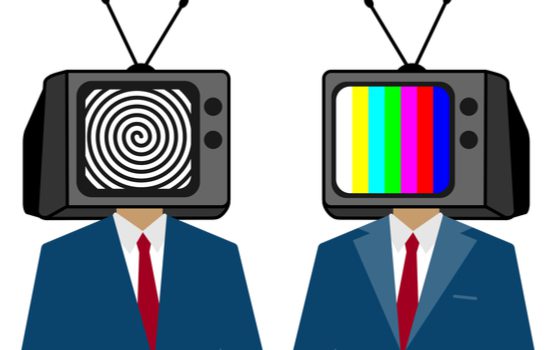This is Your Brain on Trump TV

Ever since Donald Trump first announced he was running for president, we haven’t been able to look away. He dominated headlines that week in June 2015, and has dominated them every week since.
At first, reports on the Trump campaign were half-humorous, half-incredulous. Some writers disapproved of his proposals; some found his rhetoric alarming. Some responded enthusiastically to his apparent outsider status and populist platform. But his dominance seemed so unlikely that many regarded him with bemusement rather than consternation.
As time went on, and Trump continued to dominate the national conversation, the media stories veered into the realm of the alarmed, astonished, and panicked. Trump’s eminence in the national conversation never dimmed, but rather morphed. Like looking into a funhouse mirror, the way in which reporters and newspapers perceived Trump mutated from fascinating and silly to frightening and grotesque. The amused stories of summer 2015 became the fearful articles of post-election 2016.
Regardless of tone or outlet, however, one thing has been constant: Trump has controlled our headlines and our public discourse for a few years now, and we have to give him credit for that dominance, at least to some extent. He’s given us flashy quotes, crazy tweets, and meme-able expressions. In 2016, he made the debates funnier, the headlines punchier, the boring business of politics flashier. From insulting Mika Brzezinski last year to recently declaring his nuclear button bigger than North Korea’s, Trump has always managed to give voice to the ludicrous and offensive, something that keeps him front and center.
Of course, he’s also kept the national conversation infantile, brutish, and nasty. He’s distracted from real policy issues, as well as from the presidency’s true meaning and intended role. But for Trump, media dominance seems like a largely successful strategy. Even if he becomes one of the most disliked presidents in American history, no one can deny that he’ll also become one of the most notorious.
Kevin Williamson recently described the second year of Trump’s presidency as “Trump: Season 2.” And if you think about it, Trump’s time in the spotlight has been much like a reality TV show: characterized by addictive controversy, incendiary rhetoric on all sides, and our own inability to look away from the spectacle. Anyone who’s watched an episode of “The Bachelor,” “Survivor,” or “Top Chef” knows that drama and intrigue keep viewers glued. If we think something crazy and ridiculous is on the immediate horizon, we won’t look away or turn the channel. In the same way, the palace intrigue style of journalism that’s been common throughout Trump’s first year—a style that seems to dominate Michael Wolff’s new book Fire and Fury—focuses on feeding our appetites for gossip and outrage, keeping viewers tuned in until next week.
Of course, when it comes to “The Bachelor” and “The Apprentice,” we can choose to ignore the spectacle. We can choose not to turn on the TV in the first place. But what do we do when Trump’s belligerence threatens nuclear war and diplomatic relations with key allies abroad? What’s the wise and measured stance to take in the face of a presidential sitcom that never seems to end—but rather seems to dangerously escalate?
As a wealthy and prominent New Yorker and as a reality TV star, Trump is used to shock and attention. He craves the latter, it seems, above all else. This, to some extent, is what we get for making such a person president.
But much of this reality TV drama is also the fault of our media and its methodology. Our 24/7 news cycle challenges journalists to garner clicks, to keep people fixated, to always be on top of the “next thing.” A news story back in the day would take at least 24 hours to go to press—and could dominate discourse for weeks afterwards. Now, news breaks in mere minutes, and the hot takes are expected instantaneously. We never want to slow down the cycle too much, lest we lose the attention of the ever-distracted public, give up their eyeballs and clicks via slow reads or uninteresting story angles.
Trump fascinates all Americans, it seems: we hate him or love him, fear him or idolize him. That encourages journalists to make every story Trump-centric, to feed the love or hate or fear via their reporting. Some of this reporting is a bit self-conscious or self-aggrandizing—“Trump versus the media” has become a navel-gazing war that most journalistic outlets are all too happy to fixate on, and it’s been profitable for many of them. But amid the back and forth, the endless and breathless coverage of Trump’s latest sensational comment (or two or five), we often forget to step back and consider the bigger picture. We forget, to some extent, what’s real. The tax bill is real. Congress’s inability to get health care reform passed is real. Trump’s incendiary tweets regarding North Korea are, unfortunately, all too real. But Michael Wolff’s collection of gossipy intra-White House drama? That’s “Trump: Season Two.” And it’s a distraction from the issues we should really be focussing on.
It’s perhaps telling that, in America today, we are making our presidencies into sitcoms rather than making sitcoms about our presidencies. It’s a trend that cannot possibly lead to ethical, wise, or prudent governance. So while it’s impossible to entirely look away, to refuse to read anything about Trump’s latest action or tweet, perhaps we can be more mindful of what we look at or click on. Who writes these stories, how, and what sort of tone they strike: all these things serve to encourage or dissuade our real-life reality TV drama. We’re the viewers and the voters, after all: we should be able to tell our media, and our president, what we want to watch.
Gracy Olmstead is a writer and journalist located outside Washington, D.C. She’s written for The American Conservative, The Week, National Review, The Federalist, and the Washington Times, among others.
Comments